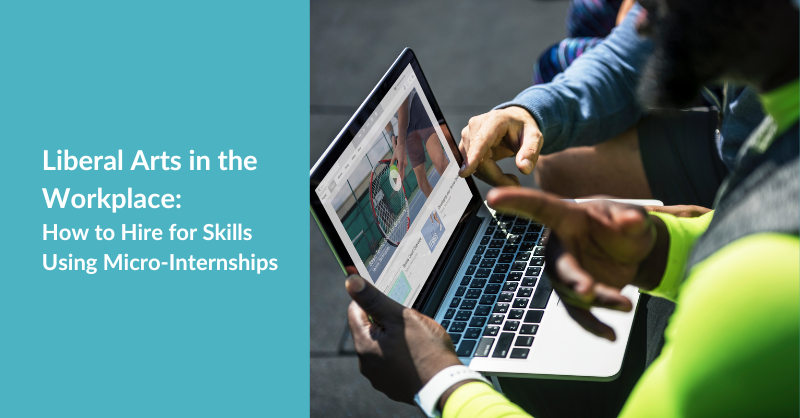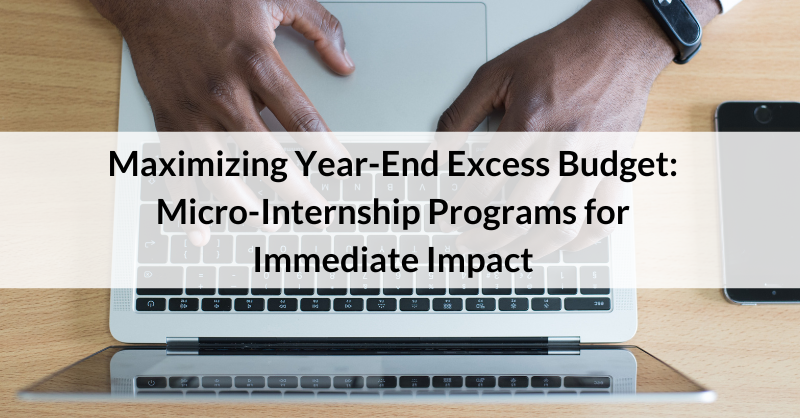
Beyond Interns, Temps, and Freelancers: Engage Students and Improve Entry-Level Hiring Outcomes With These Strategies
If you want to hire entry-level talent, you need a strong internship program. Or at least that’s what many organizations believe. Companies like Facebook and eBay recruit more than 80% of their new hires through their internship programs, and others, like PricewaterhouseCoopers, General Electric, and Weber Shandwick take on many interns and often only hire students and recent grads from their intern pools. They’ve recognized that internships can be a valuable tool for vetting talent and determining fit before a full-time offer is made.
While internships are undeniably awesome, there is an opportunity to make them even better if we recognize that the most effective entry-level talent acquisition programs aren’t built on internships alone.
Why?
- High time commitment. Most internships require at least a semester-long commitment from both the company and the Career Launcher. This can be a long time to invest if you realize during the first week or two that that he or she isn’t a good match. And if a candidate quickly realizes the position isn’t the right fit, are you really going to get their best work for a whole semester?
- Low volume. Even at large companies, most departments only have the budget or bandwidth to take on a handful of interns each semester. This limits the number of candidates a company can evaluate each hiring cycle and makes it harder to hire students who are a perfect fit. With a small talent pool, companies are apt to miss out on high-quality candidates and have less work to compare in order to find the best fit.
- Limited diversity. Typically, interns come from the same networks and schools companies hire from for full-time opportunities. This impacts the role internships can play in helping companies find rockstar talent from diverse sources and with diverse backgrounds. And with unpaid internships, companies not only take legal risks, but also limit the diversity of their talent pool even further by giving an advantage to students who are from more affluent backgrounds.
- Timing. Most companies need project support all year long, not just during the summer when most students are available for work. Plus, they need to be able to recruit entry-level talent year-round, not just during high-volume internship periods. While co-ops help mitigate the seasonal constraints of summer programs, fewer schools and companies offer co-ops and they have the same drawbacks as other internships.
Perhaps it’s factors like these that are driving a decline in internships. In a recent survey, companies said they hired 5% fewer interns in 2016 than in 2015.
If your company is struggling with entry-level recruiting, it may be time supplement your internship program and freelancer engagements with other initiatives that will help you connect with and hire students, such as:
- Company challenges
- Semester-long consulting engagements
- Campus mentoring
- Project-based consulting and Micro-Internships
Let’s take a deeper look at each of these entry-level hiring tools and determine which ones might be a good fit for your company.
Company challenges
Companies use challenges to present a problem they’re facing to a wide group of Career Launchers. Typically, they receive proposed solutions from dozens or even hundreds of challenge participants, but they’re only obligated to pay the winner.
Challenges are often used for design and branding work and executed through one-off talent platforms, but some companies are using the challenge model to solve strategic challenges as well. New entrants into the challenge platform business have made that second option more accessible by building a network of MBA students who are available to solve complex business problems.
Benefits
Challenges can be a good fit for creative one-off projects where your company could benefit from having a wide variety of ideas to choose from. They also give you a chance to test out a large number of candidates at once in a real-world setting. Those who stand out could be a good fit for further vetting for full-time roles. Even if a student isn’t selected as the “winner,” they’ll still have their work to keep in their portfolio and the knowledge gained from the experience.
Drawbacks
Only one winner is paid for each challenge, so overusing challenges could be seen as exploitative and damage your reputation. There is a growing community of designers and creative professionals who are speaking out against spec work initiatives like challenges, calling them unethical and unfair.
The format of challenges also poses a problem. Because challenges are typically presented to a large group, many challenge-seekers do not apply the same level of effort because they are uncertain if they will actually win and receive the associated benefits of doing so.
Plus, these challenges are typically not focused on Career Launchers who are highly motivated to prove themselves to companies in their search for full-time roles. As a result, companies miss out on the opportunity to use challenges to develop a strong talent pipeline and hire students.
And even though companies are able to see the final work of multiple candidates, companies typically don’t see their process leading up to their submission, and therefore can’t learn from a challenge participant’s best practices and processes.
Semester-long consulting engagements

Semester-long consulting engagements are another option for companies that want to assess Career Launchers in a real-world setting and get some work done at the same time. In most semester-long consulting engagements, a company offers a comprehensive assignment to a specific class or program at a nearby university. Students break into teams and pursue that challenge over a period of about three months, often in competition with one another. These engagements are tied directly to coursework and typically culminate in an end-of-semester presentation of each team’s solution for the company, which often takes the place of a final exam.
Semester-long consulting engagements are most popular in MBA and other graduate programs. However, some forward-thinking companies, such as Wisconsin-based Trek, have also begun to partner with undergraduate classes. Undergraduates at UW-Madison’s School of Journalism and Mass Communication recently spent a semester designing a marketing campaign to increase Trek bicycle purchases among women, and Trek intends to partner with the program again to solve a new challenge this year. Company spokespeople say they may even hire students they met through the program next time an opportunity opens up in their women’s business division. Clearly these undergraduates have the skills to immediately add real value.
Benefits
Semester-long consulting engagements can be a great fit for projects that take significant time and manpower to address. Unlike challenges, which are typically completed independently, semester-long consulting engagements allow you to see how students perform on a team. Often, that team is guided by a professor or teaching assistant, helping provide some oversight.
While most companies engage in semester-long consulting projects as a way to give back to a university by helping students gain meaningful experience, some do end up pursuing (and benefiting from) the business solutions students present. For example, Empire Building Services, a company that regularly partners with classes at Cal State Fullerton, has overhauled its accounting system, streamlined inventory management, and structured new employee rewards programs as the result of student consulting work.
Drawbacks
With most semester-long consulting engagements, companies are often not able to select the students with whom they’ll work and are paired automatically with those who have enrolled in the class at the time of the engagement. This makes it nearly impossible to target the types of students you want in your entry-level talent pool. For companies that want to use consulting engagements as a way to hire students, this can be a major shortcoming.
Additionally, companies need significant foresight to define a project and typically invest a fair amount of time and effort to interface with professors and students, getting teams up to speed on projects and judge presentations. The return may not be worthwhile, especially if the students don’t come up with ideas that are actually useful for your business (which you won’t be able to determine until the end of the semester).
And finally, it is often challenging for a company to evaluate the performance of a specific student given the team dynamics of the engagement. Was a market sizing analysis great because of the execution by the marketing major, analysis conducted by the statistics student, research of the English major, or data collection planned by the data science candidate? There’s really no way to tell for sure.
Campus mentoring

Not all internship and freelance alternatives involve project work. Campus mentoring should also play a role in your entry-level talent pipeline development strategy. Major universities like Stanford, MIT, and UCLA all use campus mentoring to help students connect with professionals who were once in their shoes for guidance in their desired career paths. Campus mentoring can take many forms, from formal mentor-mentee relationships to informal, one-off campus visits.
Benefits
Campus mentoring efforts can build meaningful connections between students and prospective employers. Students get personal insights into the field they’re interested in pursuing because the professional they’re learning from shares a background similar to their own, and companies get to evaluate talent in a setting that can feel more natural than an interview. Alumni are often best positioned to evaluate entry-level talent from their own universities because they have an understanding of the skills candidates should have gained through their education.
Drawbacks
Campus mentoring programs don’t allow you to see how a prospective hire will perform on the job, so many companies choose to follow an initial campus mentoring engagement with an internship or project-based consulting work. However, many companies can’t or won’t invest in both campus mentoring and candidate evaluation initiatives like internships just to find an entry-level hire.
Campus mentoring initiatives are also superficial by nature, and connections can sometimes feel forced. If your company wants to truly get to know a student before you make an offer, campus mentoring will likely leave you feeling shortchanged.
Perhaps the biggest drawback of campus mentoring programs, however, is the limits they place on diversity. Campus mentoring programs are limited to those schools that current employees attended. They’re often geographically limited as well, which further narrows the range of students represented in your talent pool.
Project-based consulting and Micro-Internships

Micro-Internships incorporate many of the benefits of internships, freelancers, challenges, semester-long consulting and campus mentoring, with few of the drawbacks. Through Micro-Internships (also commonly referred to as gigs or project-based consulting engagements) companies hire students and recent grads to complete short-term, one-off projects.
Micro-Interns can complete a wide variety of tasks for companies in almost every industry. For example, Power Reviews, a rapidly growing technology company, has completed numerous projects with students from schools including Dominican University, Temple, and The University of Illinois Chicago, helping them both address immediate needs and find full-time candidates. Yello, a software company, worked with a Micro-Intern from Monmouth College, a school where they didn’t typically recruit, to complete a business development project. The student impressed Yello’s leadership and they created a summer internship program for him. Even law firms like Sarnoff Baccash have worked with both undergraduates and law students from colleges such as University of Chicago, Kent Law, and DePaul on a variety of efforts.
Other companies, like Microsoft, Groupon, M. Holland, BuiltIn Chicago and LLR Partners have also worked with Micro-Interns for projects including market research, technology development, social media content creation, lead generation, and valuation analyses.
Benefits
Micro-Internships provide companies that want to hire students with access to highly-motivated individuals while giving them the chance to see a wide range of Career Launchers in action without the time commitment or risk of an internship or semester-long consulting engagement. Unlike challenges, through Micro-Internships, Career Launchers are paid for their work like freelancers, but do not require additional foresight or planning from the company. And because Micro-Internships are on-demand only as needed basis, even small companies can get access to top talent.
Additionally, since Micro-Internships allow students to choose the specific projects they’re most interested in, they gain more meaningful experience and companies get to see their best work. No student enjoys spending weeks at an internship on tasks they’re uninterested in just to get the chance to complete one or two well-aligned projects, and that model is unproductive for employers as well. Micro-Internships have less waste on both sides.
They also provide your company with on-demand support. That means you won’t find yourself stuck trying to fill a summer intern’s days with meaningless busywork or forced to do work you shouldn’t be focused on simply because you don’t have an available intern or entry-level employee.
Because of the low-risk, low-cost, short-term nature of Micro-Internships, your company can try out a large number of candidates from a variety of schools outside of your usual network during each hiring cycle, which expands and diversifies your talent pool, improves hiring outcomes and allows you to make an impact for more Career Launchers. And when it’s time to hire students or recent grads for full-time positions, you have an excellent pool of candidates you’ve already evaluated from which you know you’ll find a fit.
Drawbacks
Until recently, companies have had no good way to find Career Launchers who want to get their foot in the door through project-based assignments. Freelance sites like Guru and Upwork are used most heavily by established freelancers including many from overseas, and therefore the option to hire students or recent grads for full-time positions is limited. On the flip side, Career Launchers have historically had no way to tell companies that simply need to get work done apart from those that want to use project-based assignments as a means for entry-level hiring.
Parker Dewey was launched to fill this gap.
Parker Dewey is the only platform that makes it possible for companies to get work done while building their entry-level talent pipelines and evaluating fit for internships, co-ops and full-time roles. Using our tool, companies post the short-term projects (Micro-Internships) they need help with, and high-caliber students from top universities apply. They complete the work remotely or on-site, you pay your invoice, and we handle the rest--from passing payment onto the talent to completing all the proper paperwork. We exist to improve entry-level hiring for candidates and companies, so we’ll never charge you a fee to continue work with our talent, even if you choose to hire students full-time.
The takeaway
The best entry-level hiring strategies include a variety of the options detailed above. However, if you can choose only one or two of them, Micro-Internships must make the list. Their low-risk, on-demand nature makes Micro-Internships a perfect fit for companies of all sizes, and they have even greater benefits when paired with other initiatives like traditional internships and campus mentoring.
Are you ready to strengthen your approach to entry-level hiring? Post a project on Parker Dewey and get started today.





